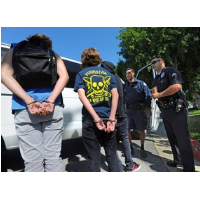Juvenile Offenders often Receive less Justice than Adults
 Los Angeles Police detaining truant students in San Pedro area (photo: Brad Graverson, Torrance Daily Breeze)
Los Angeles Police detaining truant students in San Pedro area (photo: Brad Graverson, Torrance Daily Breeze)
You would think that juveniles would be treated more fairly by the justice system than adults are, but sometimes the opposite is true.
In 1974 Congress passed the Juvenile Justice and Delinquency Prevention Act, which forbade states that received federal juvenile justice funds from incarcerating minors who committed what are known as “status offenses.” A status offense is a violation that applies only to minors, such as being truant from school, running away from home or drinking alcohol. However, in 1980 Congress amended the act to allow exceptions if a judge determines that jailing is a solution of “last resort.” But in many jurisdictions, these exceptions are actually used as an excuse to incarcerate young people without losing federal funding.
Tennessee, for example, doesn’t provide legal counsel for juveniles accused of status crimes. This has led to children pleading guilty to truancy, then being clapped in shackles and taken to jail. Since the offenses aren’t technically crimes, the constitutional right to counsel doesn’t apply.
In California there is a different problem,.Nearly all the counties in that state have instituted a new way to make money—take it from the pockets of the parents of those in the juvenile justice system.
Every jurisdiction except the City and County of San Francisco now charge parents of those caught up in the juvenile courts. Some counties, such as Alameda, charge parents for investigations, even if their children are not found guilty, according to a report by Youth Radio.
The charges, which are not assessed against adult offenders, often hit families already at the bottom of the income scale. “And sometimes it is more expensive administratively to collect these fees than the money you are actually receiving in revenue.” said Lauren-Brooke Eisen, legal scholar at NYU’s Brennan Center for Justice. “That’s the great irony of the situation.”
Parents are charged even when crimes are committed by children not in their custody. LaPorscha John owes $736 in court fees incurred when her son Joshua was held for fighting while in a private group home. Not even the death of a child can stop the fees. Zoe Mathews still owes money from her son’s incarceration in juvenile detention in 2010 even though her son was shot and killed a few months after getting out. “By being incarcerated, you're paying your debt back to society. So then they're going to charge you an additional per-night stay as if there were some options?” Mathews said. “The bills are additional stress to already a very painful situation that I will be dealing with for the rest of my life.”
-Steve Straehley, David Wallechinsky
To Learn More:
Double Charged: The True Cost Of Juvenile Justice (by Myles Bess, Youth Radio)
Juvenile Injustice: Truants Face Courts, Jailing Without Legal Counsel To Aid Them (by Susan Ferriss, Center for Public Integrity)
- Top Stories
- Unusual News
- Where is the Money Going?
- Controversies
- U.S. and the World
- Appointments and Resignations
- Latest News
- Trump to Stop Deportations If…
- Trump Denounces World Series
- What If China Invaded the United States?
- Donald Trump Has a Mental Health Problem and It Has a Name
- Trump Goes on Renaming Frenzy






Comments